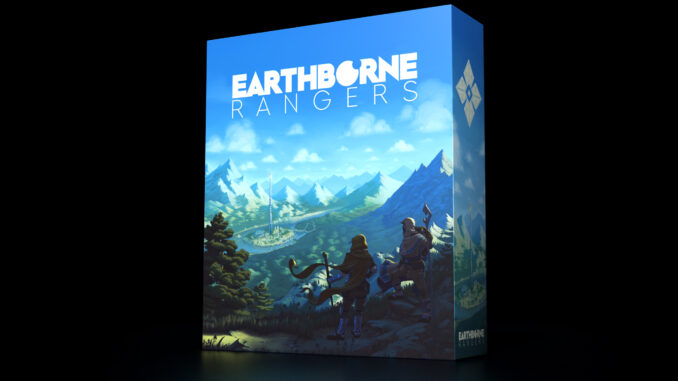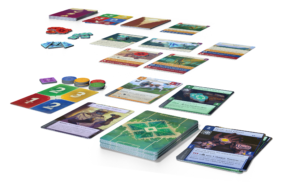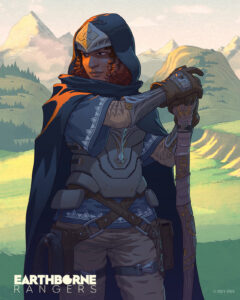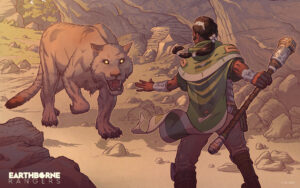
What is this project?
Earthborne Rangers is a customizable cooperative campaign card game for 1-4 players. It’s set in Earth’s far future, when we’ve gotten past destroying everything for a quick buck and have worked to regrow the natural wilderness.

What do I get?
For $80, the game comes with a complete set of 500 cards and a campaign book. Players will use the cards to build their personal ranger decks and then can play the game in single sessions or in a continuing campaign. The game is intended for a campaign style play but does not independent sessions.
Stretch Goals?
This is one of the project’s more unique features. Instead of stretch goals that add more and more features to the game, their goals focus on expanding the game sustainability. The more backers they get, they’ll produce the game in more regions. This will cut down on the environmental impact as games don’t need to be shipped as far. It will also help slightly more local economies as the game you purchase will be made on your continent.
It is an interesting idea to have the games production be determined by the amount of interest in the game. That is one of the advantages of a Kickstarter approach. You don’t make a ton of items and then find out no one wants to buy them. Having the games produced close to where they will need to be delivered cuts down on a lot of unnecessary shipping. Earthborne Games efforts are done from a genuine effort to have the least impact. But I can also see how some companies could abuse this approach. Give up all efforts to produce sustainably, or ethically, and offer different price tags for goods and pass all responsibility on to the consumer.
Will it fund?
It already has and then some.
Why should I back it?
If you’re looking for a cooperative campaign game. If you like deck building games this could be for you. If you are looking for a game where the goal isn’t to fight something, this could be it. Or if you want to support a company whose goals are sustainable production…well, don’t buy something you won’t use, but go for it if you will.
Interview with Andrew Navaro
Wayne Basta: First, thank you for taking the time to speak with me. Please share with our readers who you are and your gaming background.
 Andrew Navaro: You’re welcome! Thank you for the opportunity. I’m Andrew Navaro, founder and creative director of Earthborne Games. Previously, I worked for 15 years at Fantasy Flight Games where I held a variety of positions ranging from Graphic Designer, to Art Director, to Creative Director, to Head of Studio. For the past year and change I worked as the Studio Director at Chip Theory Games, and before all of that, ages ago, I worked as a freelance illustrator on a few indie RPG titles including Primetime Adventures and The Shadow of Yesterday.
Andrew Navaro: You’re welcome! Thank you for the opportunity. I’m Andrew Navaro, founder and creative director of Earthborne Games. Previously, I worked for 15 years at Fantasy Flight Games where I held a variety of positions ranging from Graphic Designer, to Art Director, to Creative Director, to Head of Studio. For the past year and change I worked as the Studio Director at Chip Theory Games, and before all of that, ages ago, I worked as a freelance illustrator on a few indie RPG titles including Primetime Adventures and The Shadow of Yesterday.
WB: The game’s art aesthetic gives a mix of sci-fi alien planets and fantasy setting wilderness but is set on a reforested Earth of the future. Where did the idea for the game originate?
AN: The idea for the setting came from a session of playing either Fallout 4 or Fallout 76. I don’t remember which. As I was playing, I started to question why it was that I enjoyed spending time in that world. It’s such a bleak and miserable place, I started to wonder if we were putting our creative energies toward the wrong things.
We can see so much of the science fiction of the past 100 years now realized in our daily lives, that I wonder how much we helped to manifest that through our collective will and effort.
I started to wonder about whether or not we’re helping to create a dismal future for our planet by continuing to imagine it as a giant, irradiated trash heap in the vast majority of popular media. I then starting thinking about what an alternative to that vision could be. I began to direct my creative energies toward imagining a bright future for the earth and for humanity, instead of one that was hopeless, where the actions we take today carry no weight because we view our future as a lost cause. Once I consciously altered my perspective, the world of Earthborne began to reveal itself. Then it was just a matter of taking notes on all that I saw.
 WB: In the video, you mention you can’t win or lose a game. Can you tell me a bit more about what you mean by that?
WB: In the video, you mention you can’t win or lose a game. Can you tell me a bit more about what you mean by that?
AN: I wrote about this at length in one of the Kickstarter updates. Here’s an excerpt:
While there is no countdown timer or doom clock in Earthborne Rangers, that doesn’t mean there aren’t objectively “good” and “bad” outcomes. If, for example, you have a mission to divert a flood that is threatening a village, the desired outcome is pretty clear. You’re going to want to divert that flood, and if you fail to do that, that’s certainly going to feel like you’ve lost that particular game. Succeed or fail, however, the narrative will continue. Succeeding may grant you a reward, but failing may open a new narrative path, and give you the opportunity to help rebuild that village, which may grant you an entirely different reward.
As with all games that have a strong narrative with which you’re invested, if you fail to divert the flood, you may decide to “reload” and try again (like reloading your save if things didn’t go how you thought they would on Virmire–Mass Effect fans know what I’m talking about). That choice, however, will be up to you. From the game’s perspective, you can continue, and see what happens next.
That’s what “losing” a mission looks like.
Another question we’ve been asked is “can I lose a campaign?” Using the definition of “losing” from the above example, the answer is yes. There are multiple endings planned for the campaign, and one of them, almost assuredly, will be viewed as the “bad” ending. That ending, however, is probably my favorite ending, so if it comes to pass at the end of your campaign, my sincere hope is that you’ll run with it, as it will persist into the Legacy of the Ancestors campaign expansion and allow for some pretty fun stuff to happen in the story that follows.
 WB: It’s not specified, but the game doesn’t appear to be about combat. There are predators mentioned but my impression is they are a challenge to overcome rather than an enemy to defeat. Can you talk a little about that?
WB: It’s not specified, but the game doesn’t appear to be about combat. There are predators mentioned but my impression is they are a challenge to overcome rather than an enemy to defeat. Can you talk a little about that?
AN: You are correct. There is no capital E enemy in Earthborne Rangers nor is it focussed on combat (though physical confrontation is an element of the game). The other games in the genre each have an opposing force, where you are racing toward the finish to accomplish your goals before the villain accomplishes theirs. Since there are already plenty of options for you if you’d like to play a game like that, I wanted to do something different.
A core design concept that has been present from day one was to create a game that did not have a constant, oppressive presence trying to make your life as the player as miserable as possible. Instead, the challenge comes from traversing the terrain, encountering wildlife and other strange beings while also trying to accomplish one of the game’s many missions. Your active mission re-contextualizes the cards you’ll discover in each location by altering the ways in which you interact with them, making return visits to locations feel very different from one visit to the next.
WB: How do Ranger’s personalities and Backgrounds impact the game? Does this only affect deck-building by imposing card restrictions, or does it come into play during the game
AN: Currently, the Ranger card sets only affect deck building, but it *is* tempting to seed narrative hooks based on your background into the campaign. It’s certainly something I’ve considered. There’s a lengthy update that goes into great depth about the deck-building if you’d like to check it out.
In many games where you can build your own deck, you end up with a lot of extra cards that never get used. One of your Add-Ons is a Ranger Deck Doubler. What is the intention behind this set?If you own a single core set of Earthborne Rangers and use it to play a full four player game, very few of the player cards will “never get used.” It includes just enough cards to where each player may choose a different background/specialization combination with which to create their character. If, in this situation, you’d prefer to have more options for your mix of Rangers, you can pick up the Ranger Card Doubler, which is simply another full set of core set player cards. You’ll then be able to have Rangers in your group who share a background or specialization (or several other things).
I wanted to offer this product because of how many players end up purchasing multiple copies of an LCG core set, even when it’s not strictly necessary, just to have more copies of the player cards on hand. This way you can own more player cards without also owning a bunch of “encounter” card content that you have no use for. It’s a far less wasteful approach.
WB: Your game has no traditional stretch goals (ie more stuff to include) but it does have goals for sustainability through regional production. What made you decide to go this route?
AN: The regional manufacturing stretch goals speak directly to Earthborne Games’ mission of manufacturing games as sustainably as possible. Regional manufacturing is a huge part of that, but we need a critical mass of backers in each region (US, UK, EU) to make that happen.
Whenever I tried to envision a version of the campaign that had more traditional stretch goals — like additional cards or card sets or extra bits — I found myself wanting to simply include them in the game without any qualifiers.
We’re going to make the game as amazing as we possibly can, so the idea of hiding any significant improvement to the game behind a stretch goal only for the sake of marketing felt entirely disingenuous.
WB: How hard was it to find manufacturers that met your sustainability goals?
AN: Since Earthborne Rangers is a card game, and therefore relatively easy to manufacture, it has not been difficult to find manufacturers who can meet our requirements for sustainable materials. FSC certified paper is not hard to find. It’s only more expensive.
The manufacturers with whom I have spoken all offer varying levels of sustainability, either through their own efforts or those of their suppliers.
If you’d like to dive deep into our sustainability goals, you can read about them on the main Kickstarter page, or read my guest spot on Jamey Stegmaier’s industry blog.
WB: Related to the regional production, so many games are manufactured in China and shipped world-wide. Did you have to make any compromises or changes in the games materials or design in order to keep the costs down enough to be an affordable product?
AN: Absolutely not. Earthborne Rangers will be of equal or greater quality to any comparable game you might see out of China. I’m not looking to cut costs to maximize profit. I’m simply willing to make less money per copy in service of doing things the right way.
WB: Are there more expansions planned or is this a standalone product? Also, many of you involved have past RPG development experience, any plans to take the IP into other game forms?
AN: In addition to the core set, you’ll be able to get the first campaign expansion as part of the Kickstarter. Beyond that, I have a lot of ideas for expansions. The game was designed to be expanded, but the degree of success of the Kickstarter, and the level of success we find in the coming year, will determine just how many of those ideas we’ll be able to make into a reality and when.
I would love to make a straight-up Earthborne tabletop RPG. As you noted, given the people involved with Earthborne Rangers, it seems very sensible. First thing’s first though!
WB: Anything else you would like to share with our readers and the great big internet?
AN: If you’re interested in the game, I urge you to check out our Kickstarter campaign which ends on August 17th. There’s a ton of information there if you’d like to learn more. It’s a card game, but it is heavily influenced by the gameplay philosophies presented in games like Dungeon World and The Burning Wheel. If you enjoy alternate takes on traditional mediums, Earthborne Rangers is to the current co-op card games what games like Dungeon World are to Dungeons and Dragons.
WB: Thank you for speaking us today, Andrew!


